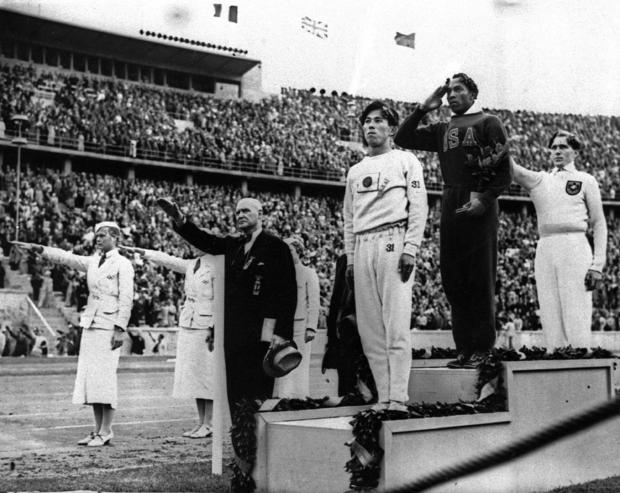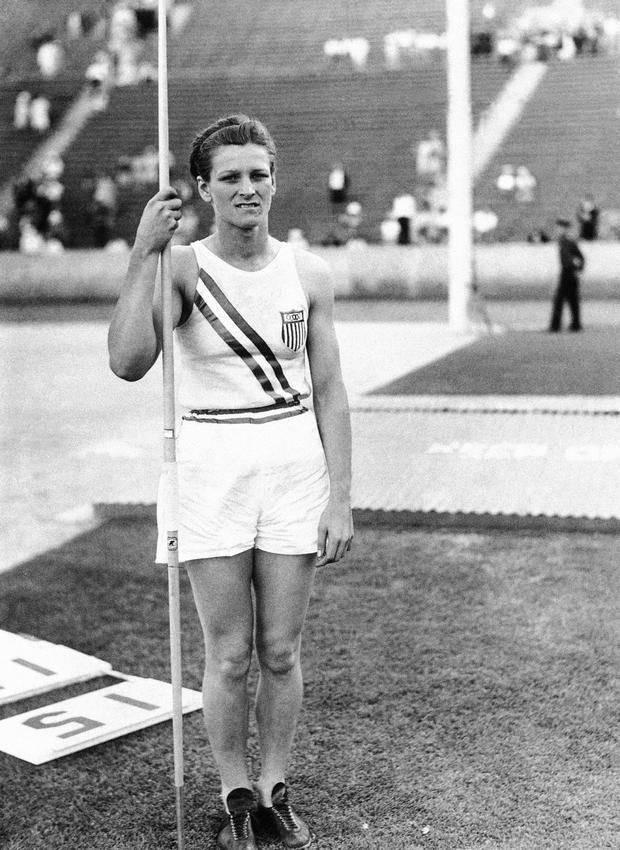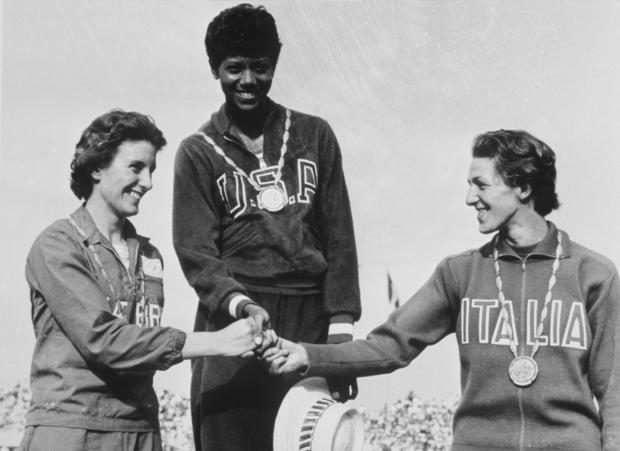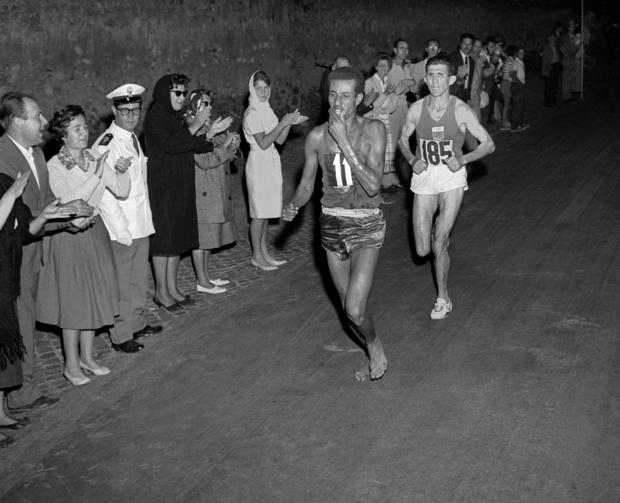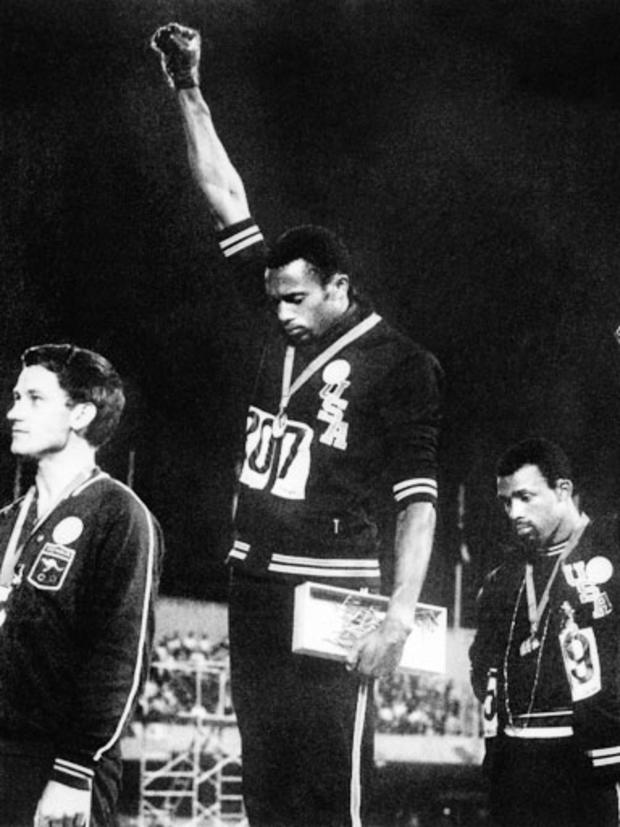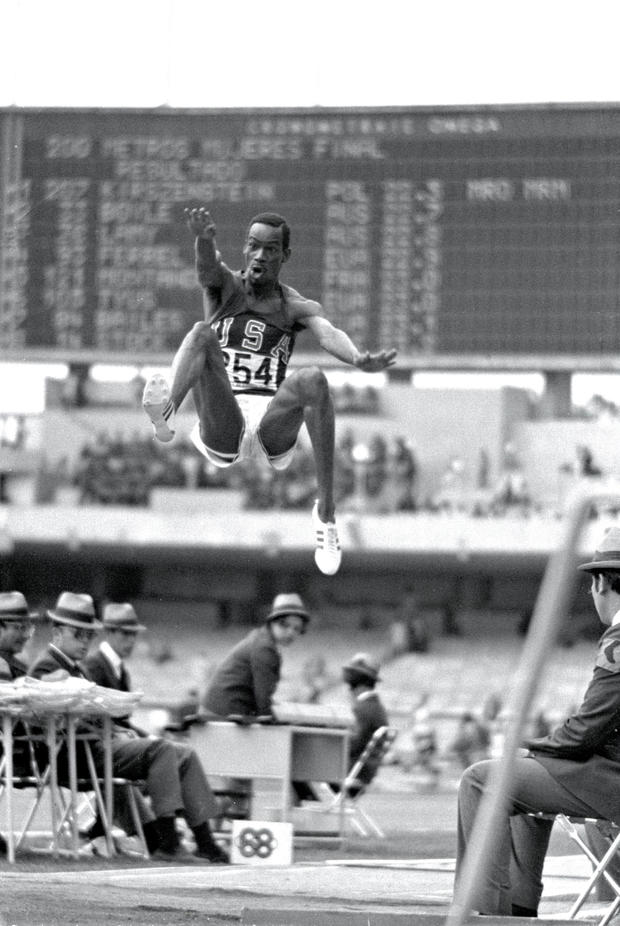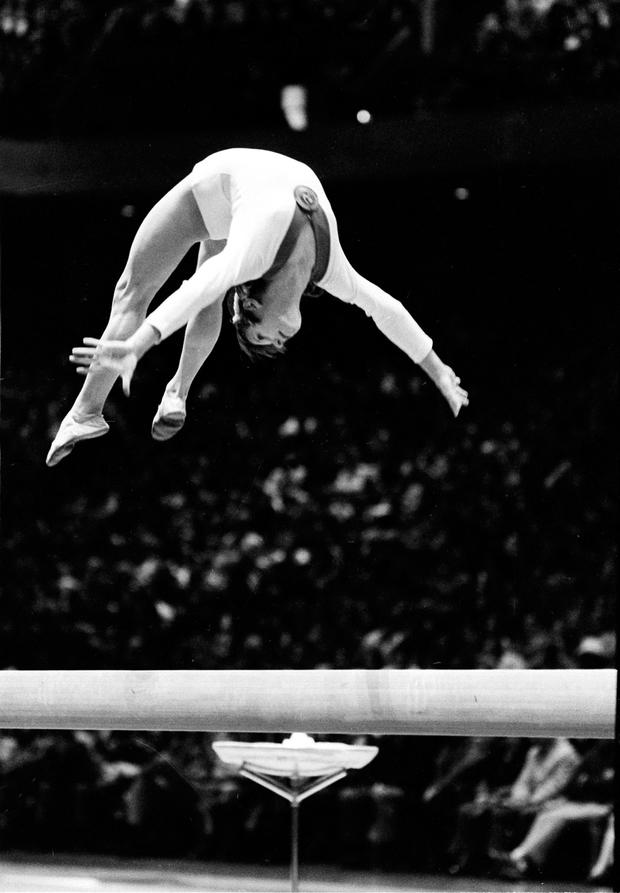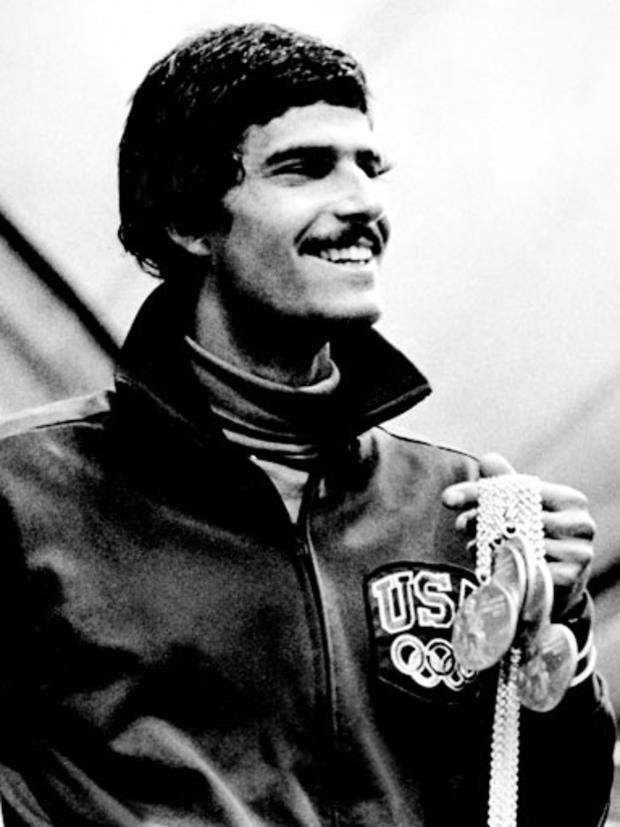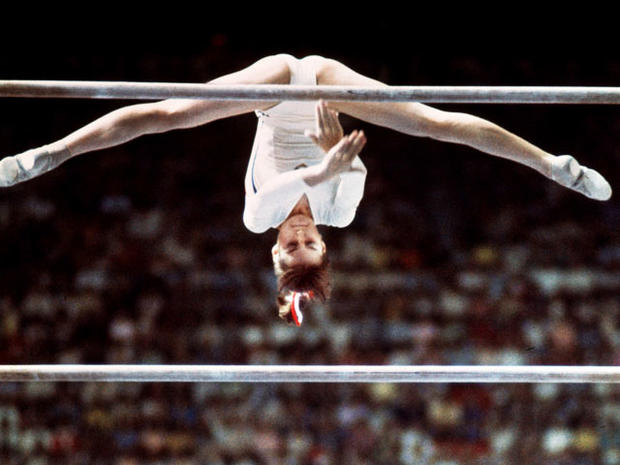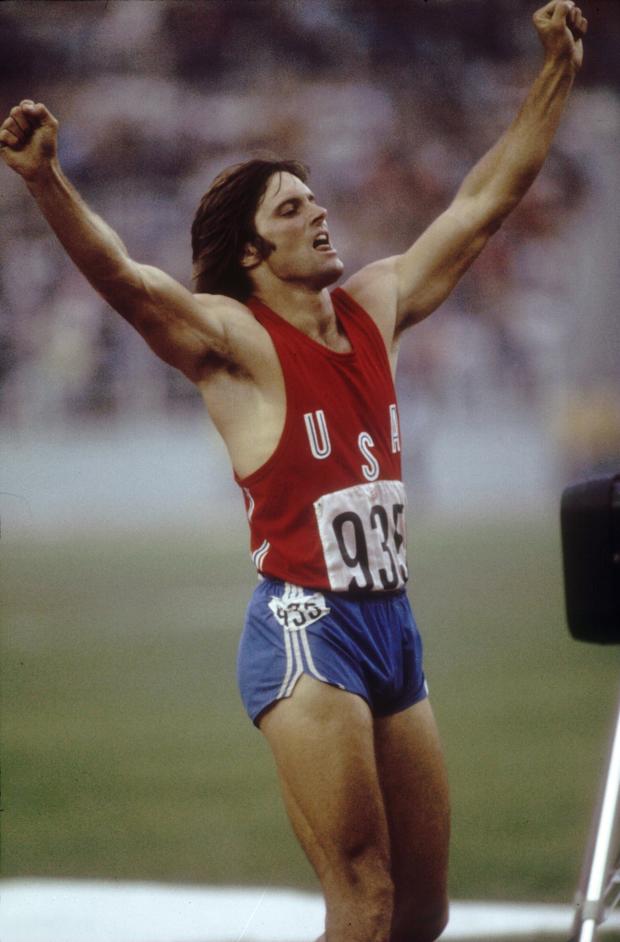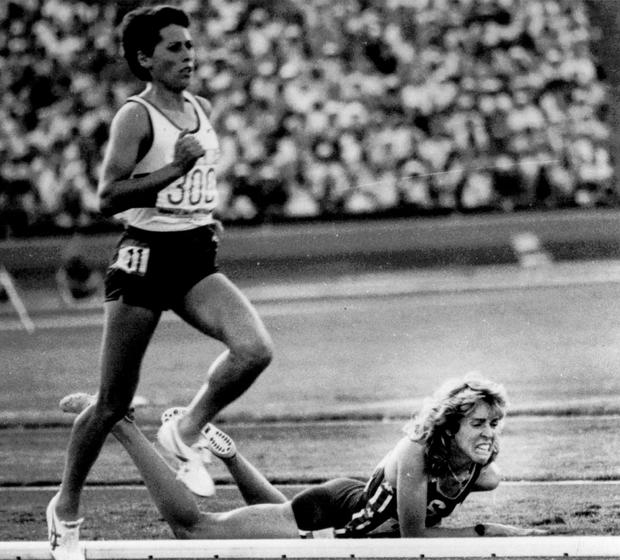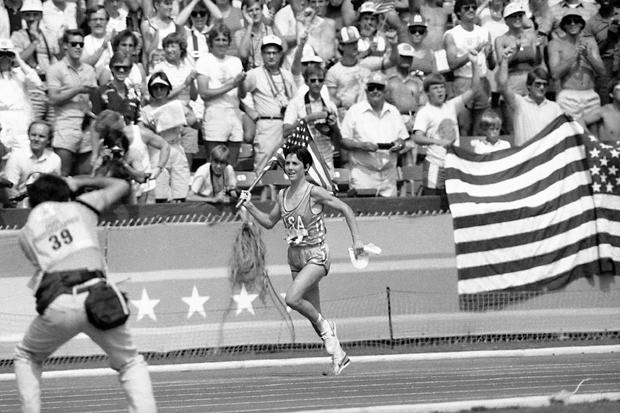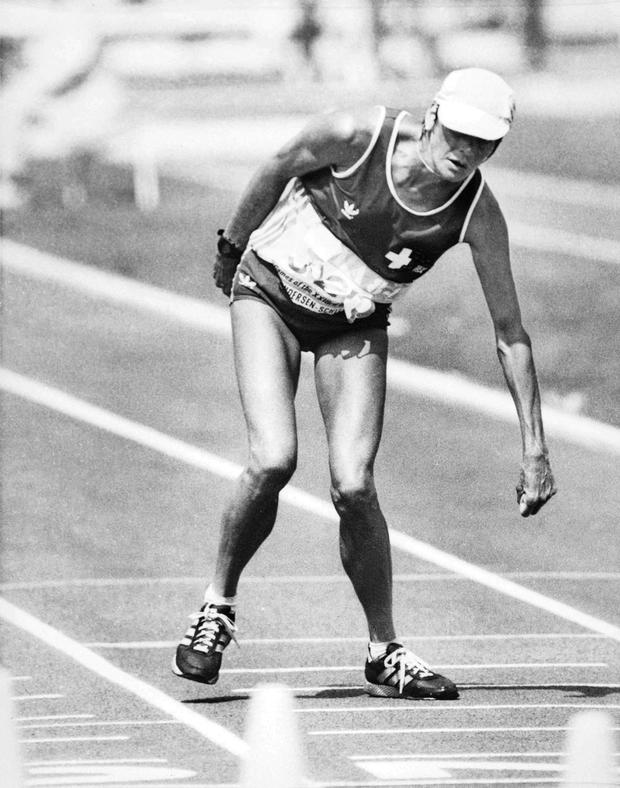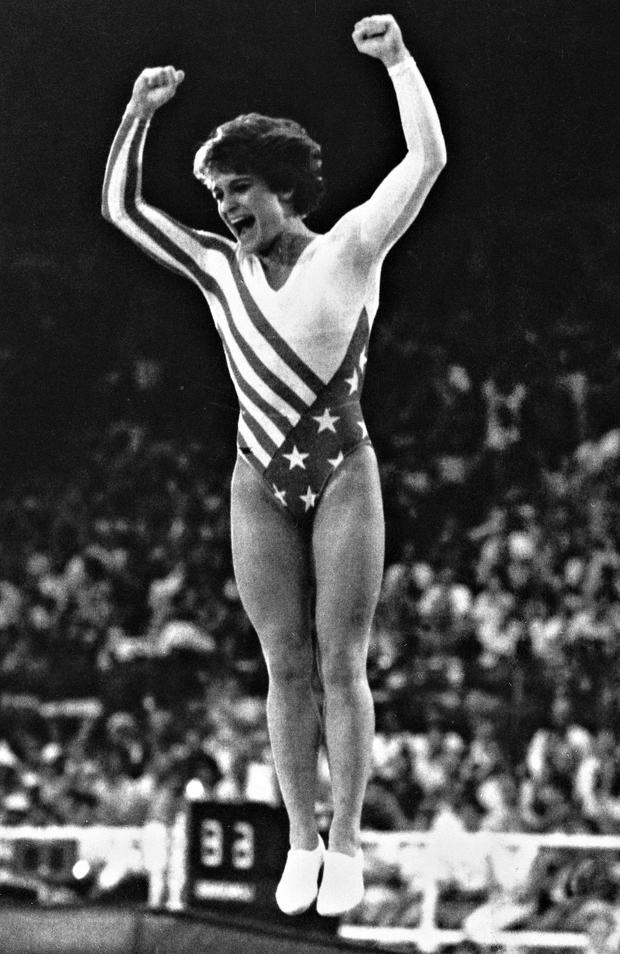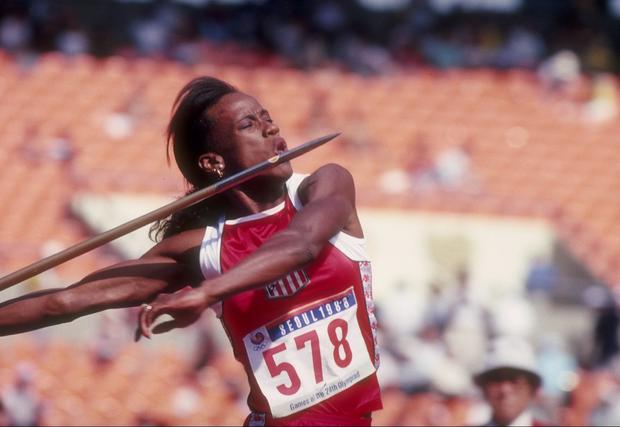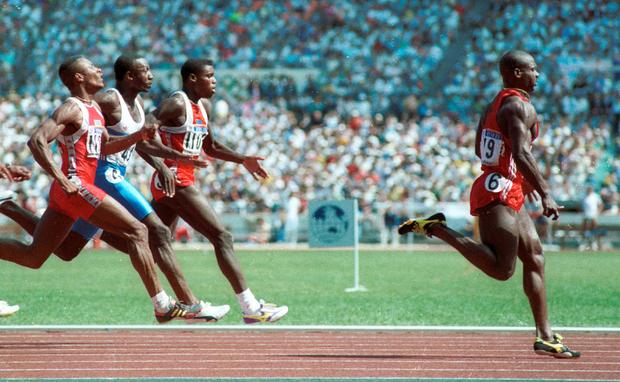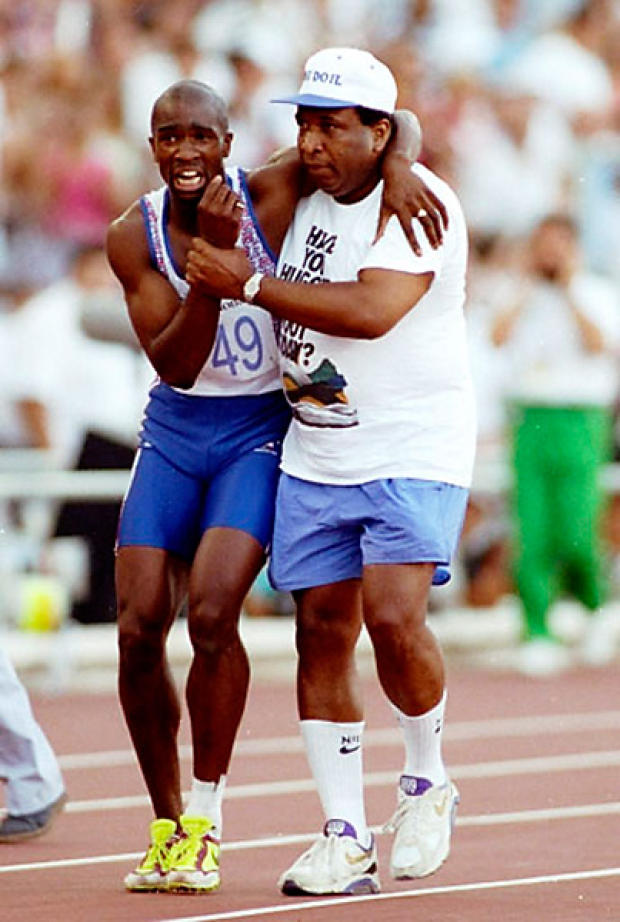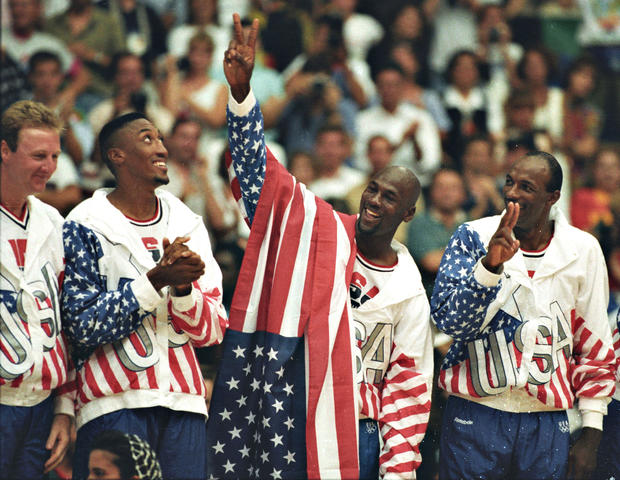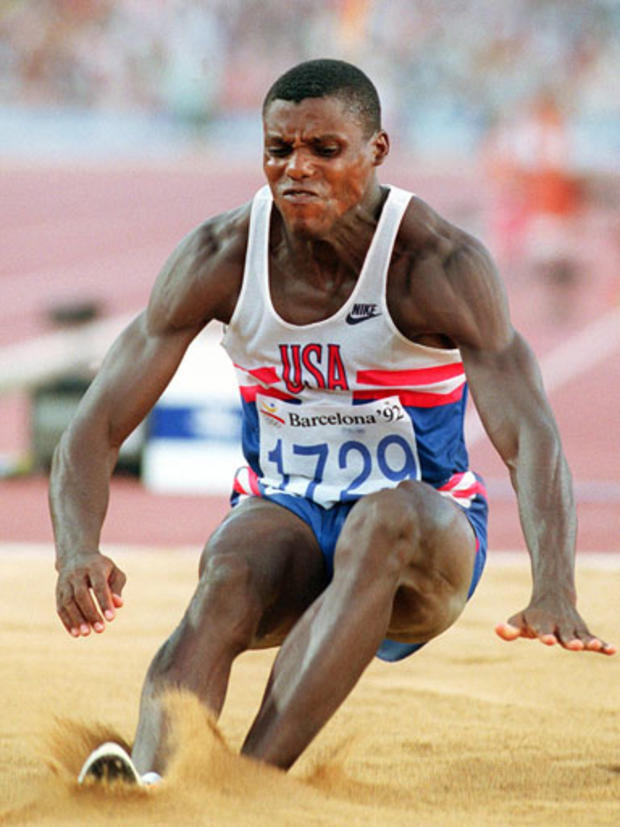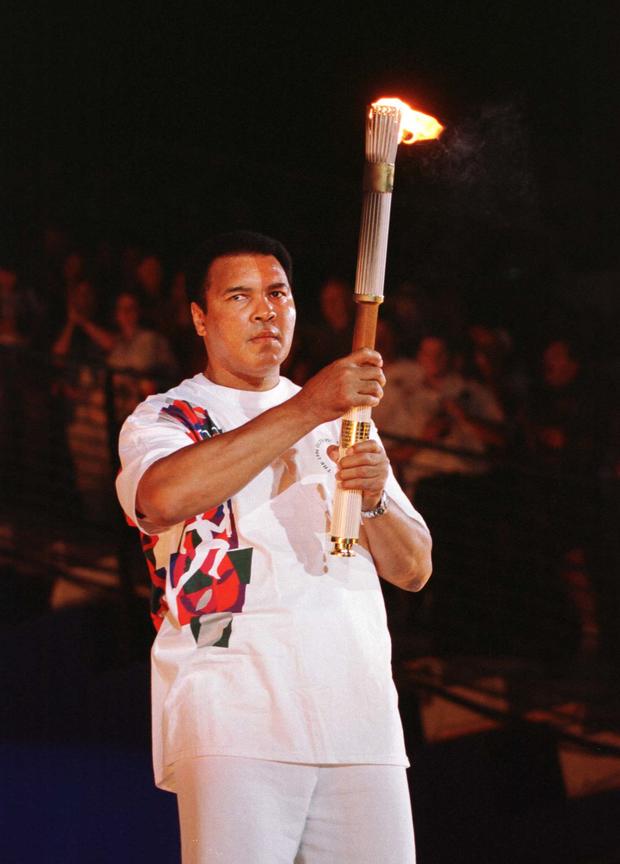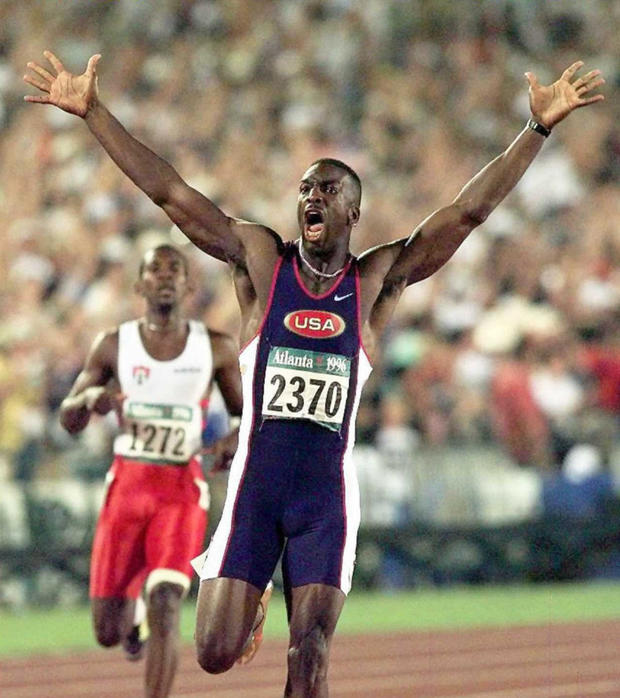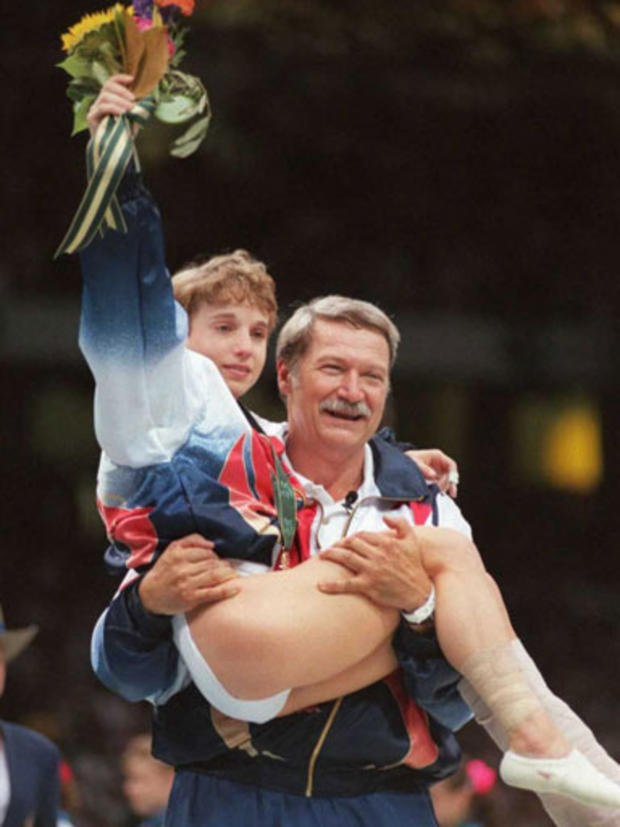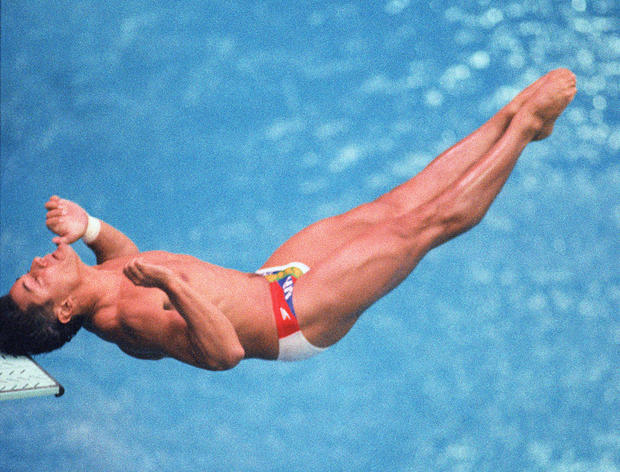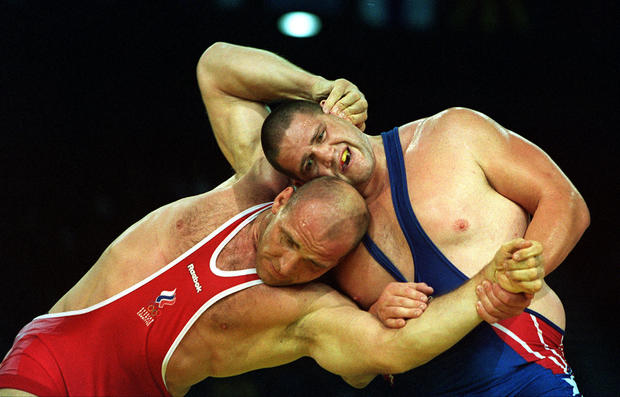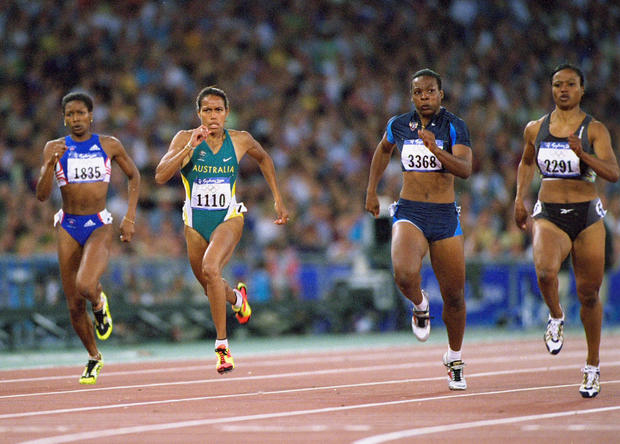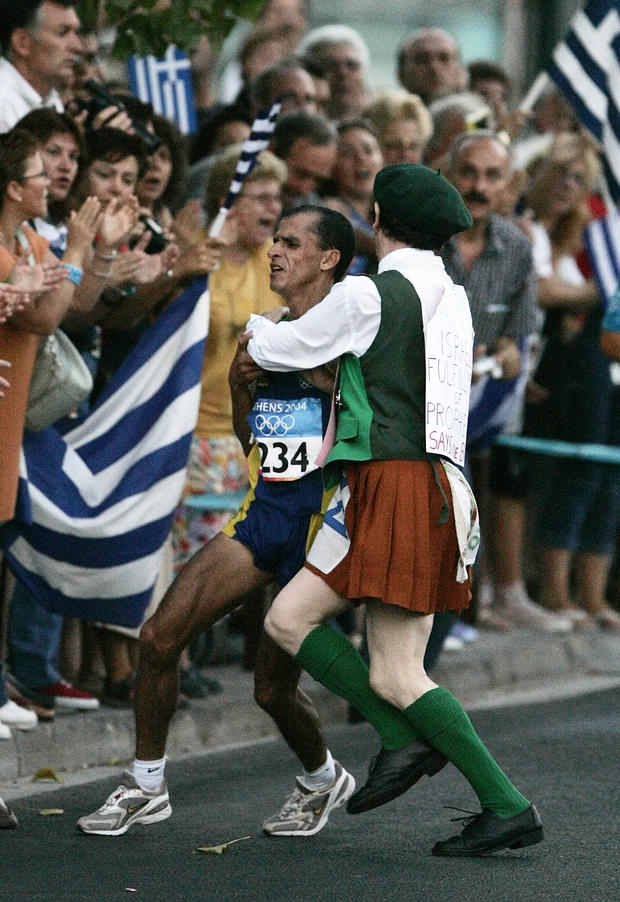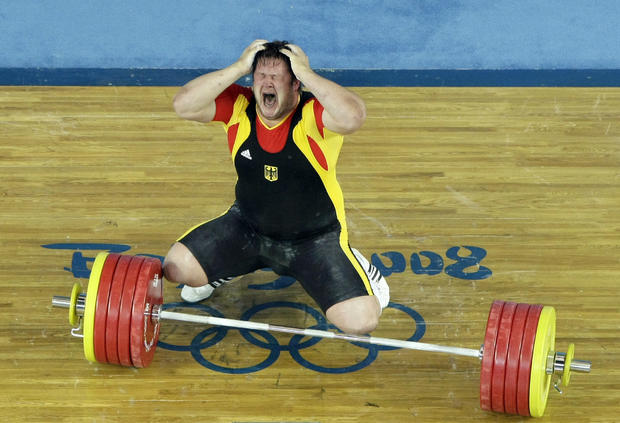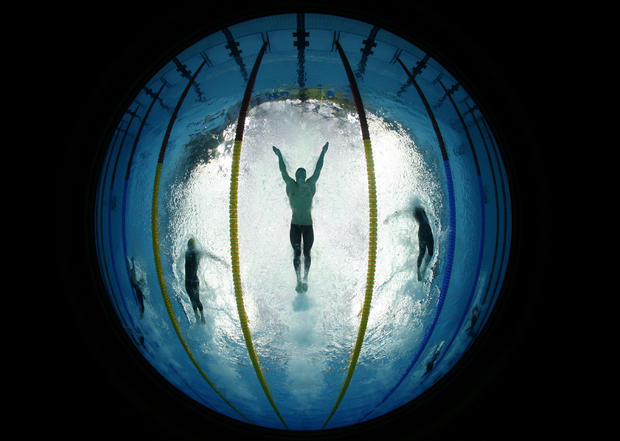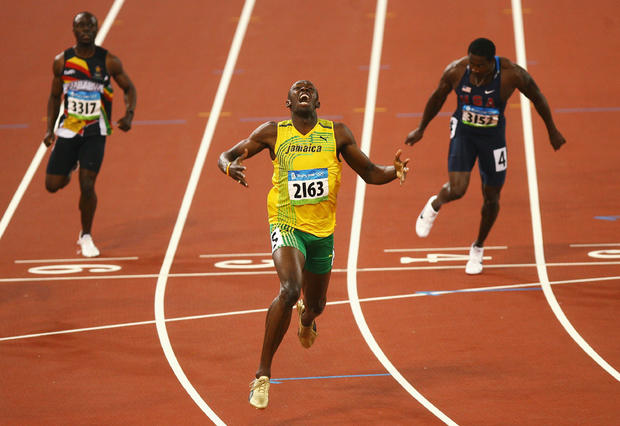Memorable Olympic moments throughout history
Every Olympics is filled with high drama and amazing sporting feats. Here’s a look at memorable moments through the years.
American Jessie Owns stands on the podium after winning the gold medal for the long jump at the 1936 Berlin Olympics. Owens won four Olympic gold medals in 1936 for the 100m, 200m, 4x100m and long jump. Grandson of a slave and the son of a sharecropper, the African-American’s huge success upended Adolf Hitler’s goal of using the Olympics to showcase the superiority of the white Aryan race.
1932 - "Babe" Didrikson
Mildred "Babe" Didrikson of Dallas at the Olympic Stadium Los Angeles on July 31, 1932, when she sent the javelin soaring 143 feet 4 inches to better by more than 11 feet the former mark held by E. Braumiller of Germany.
In Didrikson's era, women were only allowed to enter three Olympic events. She amazingly won the javelin and the 80-meter hurdles, while breaking four world records. She made a record-making high jump, which was disallowed and resulted in her receiving a silver medal.
1960 - Wilma Rudolph
American runner Wilma Rudolph, middle, stands on the awards podium with competitors Dorthy Hyman, left, and G. Leone after winning the gold in the 200 meter sprint at the 1960 Summer Olympics in Rome.
Rudolf had worn a leg brace from the age of four to nine because of polio. At 16, she won four Olympic medal in Rome, including three golds, and set two world records. She was the epitome of someone who overcame incredible odds to accomplish great things.
1960 - Abebe Bikila
Ethiopian athlete Abebe Bikila became famous for winning the Rome 1960 Olympic Games marathon barefooted. He had been a last minute replacement for another runner on the team who fell ill. When the running shoes he was offered didn't fit well Bikila chose to run without them.
Bikila won in a record time of 2:15:16.2, the first athlete from Sub-Saharan Africa to win an Olympic gold.
1968 - Black power salute
U.S. athletes Tommie Smith (center) and John Carlos (right) raise a single black gloved fist in a Black Power salute to express their opposition to racism in America during the playing of the American national anthem, after receiving their medals, Oct. 17, 1968 for first and third place in the men's 200m event at the Mexico Olympic Games. At left is Peter Norman of Australia who took second place.
The iconic moment, captured by Life magazine photographer John Dominis, outraged millions of Americans. Because of the act, Smith and Carlos were removed from the relay team and suspended from the U.S. team. They also received death treats. What few may not know is that the two men were shoeless on the podium in a symbol of empathy with the poor. Norman knew in advance what they would do and stood in solidarity wearing a badge of the Olympic Project for Human Rights.
Carlos has said of the moment, "We knew that what we were going to do was far greater than any athletic feat."
1968 - Bob Beamon' great leap
Bob Beamon of the USA leaped six feet into the air and made a record-shattering long jump of 8.90 meters (29 ft, 2 1/2 inches) on his first attempt to win the gold medal in the Summer Olympic Games in Mexico City, Oct. 18, 1968. Beamon added an incredible 58 cm (22.8 inches) to the world record. It was twelve years before anyone else reached 28 feet (8.53 metres) and the record stood until 1991 when Mike Powell of the U.S. leapt 8.95 meters (29.3 feet) in Tokyo to win the world title.
1972 - Olga Korbut
Russian gymnast Olga Korbut won hearts the world over with her 1972 Olympic performance and three gold medals. She became associated with the "Korbut Flip," which involved standing on the high bar and performing a back flip on the uneven bars, which propelled her into stardom. It was considered one of the most awesome moves in gymnastics and has since been actually forbidden because of the risk.
The daring pixie gymnast Korbut was also the first to perform a backward somersault on the beam (seen in this photo).
1972 - Mark Spitz
American swimming champion Mark Spitz, seen here with five gold medals, captured seven swimming golds (100m, 200m, 4x100m, 4x200m, 100m and 200m Butterfly and 4x100m medley) at the 1972 Olympic Games in Munich.
It was an unprecedented number of wins, only surpassed in 2008 by fellow American Michael Phelps.
1976 - Nadia Comaneci
At 14-years-old Romanian Nadia Comaneci made history as the first gymnast to ever be awarded a perfect score of with 10at the 1976 Montreal Olympics on July 18. She went on to receive six more scores of 10 and win three gold medals. She was the first Romanian gymnast to win the all-around title at the Olympics and the youngest Olympic all-around champion ever.
1976 - Bruce Jenner
Bruce Jenner of the USA celebrates during his record setting performance in the decathlon in the 1976 Summer Olympics in Montreal, earning that title of "World's Greatest Athlete."
1984 - Mary Decker "The Fall"
The United States' Mary Decker falls onto the infield after a collision with Great Britain's barefooted Zola Budd in the women's 3,000-meter event at the Los Angeles Olympics, Aug. 10, 1984. Portugal's Aurora Cunha (300) is left.
Decker, who was favored to win gold, was eliminated from the race and was carried off the track in tears because of "The Fall." Budd finished seventh. Decker blamed Budd for what happened and initially race officials agreed, disqualifying the Briton. Budd was reinstated just one hour later after race footage was viewed however.
1984 - Joan Benoit
Freeport, Maine's Joan Benoit carries an American flag after finishing the first-ever women's marathon in the 1984 Summer Games August 5th at the Los Angeles Memorial Coliseum. The 27-year-old Benoit finished the 26-mile, 385-yard distance in 2.24:52.
1984 - Andersen-Scheiss
Gabriela Andersen-Scheiss, suffering from heat exhaustion, staggers to the finish line of the 1984 Olympic women's marathon in the Los Angeles Coliseum on Aug. 5th. Andersen-Scheiss finally crossed the line in 37th place, and collapsed into the arms of waiting medics.
1984 - Mary Lou Retton
American Mary Lou Retton leaps in the air after scoring a perfect 10 on the vault in her final routine to win the women's all-around gymnastics gold medal at the Olympics in Los Angeles, Aug. 4, 1984.
The sixteen-year-old Retton became the first American gymnast to win a gold medal in the Olympics.
1988 - Jackie Joyner-Kersee
The American First Lady of athletics, Jackie Joyner-Kersee, throws the javelin during the heptathlon competition at the 1988 Summer Olympics in Seoul.
Joyner-Kersee won the gold with 7,291 points, a new world record.
1988 - Ben Johnson
Sprinter Ben Johnson of Great Britain wins the gold medal in the 100m sprint at the Seoul Olympics, September 24, 1988. Behind him are (L to R) Calvin Smith, Linford Christie and Carl Lewis. Johnson later lost the medal when he tested positive for steroids.
1992 - Derek Redmond
The medal favorite, British runner Derek Redmond, tore his hamstring in the semi-finals for the 400 meters, but was determined to finish the race despite being in considerable pain, Aug. 3, 1992.
In an emotional, agonizing scene, his father Jim Redmond jumped from the stands to help his injured son finish. Jim Redmond only let go near the finish line so his son could cross the line by himself, as the crowd roared in suppport.
1992 - NBA pros play
U.S. NBA star Michael Jordan gives the victory sign as he stands with teammates before receiving the gold medal at the 1992 Barcelona Olympics. It was the first Olympics that allowed NBA pros to lpay and the team--with the likes of Jordan, Shaquille O'Neal, Magic Johnson and Charles Barkley--that was recruited was quickly nicknamed "The Dream Team."
The competition didn't stand a chance against the high-powered team.
1992 - Carl Lewis
1996 - Muhammad Ali
Former boxer Muhammad Ali, a Gold Medal winner in in the 1960 Olympics when his name was Cassius Clay, holds up the torch prior to lighting a device that would carry the flame up the cauldron, during the opening ceremonies of the XXVI Centennial Olympic Games in Atlanta, July 19, 1996. His appearance was not publicized ahead of time to have the maximum impact.
Ali, suffering from Parkinson's disease and with his whole body shaking, was greeted with huge applause. Former President Bill Clinton said, during Ali's memorial service in June 2016, "I was weeping like a baby seeing his hands shake. No matter what it took, the flame would be lit. The fight would be won. I knew it would happen."
1996 - Michael Johnson
Michael Johnson of the U.S. crosses the finish line August 1, 1996, to set a new world record in the Olympic 200m race with a time of 19.32 seconds. He beat his own record of 19.66 seconds. Johnson hurtled into history books in a world record time as he accomplished an unprecedented Olympic double with the 400m and the 200m.
1996 - Kerri Strug
U.S. Olympic artistic gymnastics' coach Bela Karolyi carries injured gymnast Kerri Strug onto the podium after Strug helped lead the team to the women's gold medal on July 23, 1996 at the Georgia Dome in Atlanta. The U.S. beat out Russia for the first time in Olympic history.
Strug fell and injured her ankle on her first vault, but still managed to hit the landing on her second before giving into pain in front of an international audience. At 18-years-old, her heroic performance made front page news everywhere.
2000 - Greg Louganis
Two-time Los Angeles gold medalist Greg Louganis of the U.S. bangs his head against the board after mistiming his dive during the Olympic competition, Sept. 2000 in Seoul. Louganis nonetheless qualified for the final.
2000 - Rulon Gardner
Rulon Gardner of the U.S. (right) in action winning the gold medal by defeating Alexandre Kareline of Russia in the 130 kilogram event during the Greco Roman wrestling held at the Sydney Convention and Exhibition Centre in Darling Harbour during the 200 Sydney Olympic Games.
It was a monumental upset since Karelin had been undefeated for 15 years. It took going into exciting overtime, but Gardner came out on top.
2000 - Cathy Freeman
Cathy Freeman of Australia (1110) ran a time of 48.63 seconds in the 400 meters at the 1996 Atlanta Games, earning a silver and becoming the first Aboriginal medalist in an individual event.
2004 - Marathoner accosted
Vanderlei de Lima of Brazil is grabbed by a lone spectator while leading the men's Olympic marathon during the Athens Olympics, August 29, 2004.
De Lima got away and rejoined the race, holding his leg, with around 15 minutes to run but lost the lead to Italian Stefano Baldini soon after.
2008 - Matthias Steiner
Matthias Steiner of Germany celebrates after winning the gold in the men's +105 kg, weightlifting competition at the Beijing 2008 Olympics, Aug. 19, 2008.
Steiner was a sheer symbol of overcoming adversity. He won the gold, lifting almost 30 pounds over a previous best, a year after losing his wife in a car accident.
2008 - Michael Phelps
Michael Phelps (C) of the U.S. swims the butterfly stroke during his team's victory in the men's 4x100 meters medley relay at the National Aquatics Center during the Beijing 2008 Olympics August 17, 2008.
Phelps set new standards in Olympic swimming with his eight gold medals in Beijing, surpassing the record set by Mark Spitz in 1972.
2008 - Usain Bolt
Usain Bolt of Jamaica reacts after breaking the world record with a time of 19.30 to win the gold medal in the Men's 200m final ahead of Brian Dzingai of Zimbabwe and Shawn Crawford of the United States at the National Stadium during Day 12 of the Beijing 2008 Olympic Games on Aug. 20.
Bolt won gold in the 100 meter, 200 meter and 4x100 meter relay--a feat not seen since Carl Lewis in 1984. Along the way, he set new world and Olympic records in the 100 and 200 meter events and helped the Jamaican team set a record in the relay.
